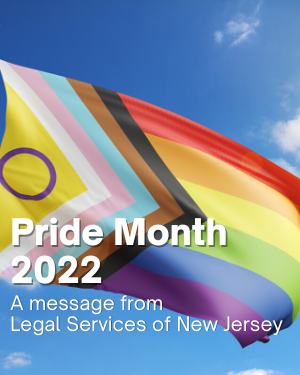 This Pride Month and all year-round, Legal Services in New Jersey is proud to serve, celebrate, and stand in solidarity with the LGBTQ+ community. As we strive to secure economic, social, and legal justice for all, we will continue to combat discrimination in every form, including on the basis of sexual orientation and gender identity and expression. As part of this commitment, we invite you to watch, or re-watch, the latest installation of the Melville “De” Miller, Jr. Justice Series, which explores the recent surge of bias and hate crimes both nationally and in New Jersey.
According to New Jersey Attorney General Matthew Platkin, law enforcement agencies received reports of more than 1,871 bias incidents in 2021, setting a record high for the third year in a row. From 2020 to 2021, the New Jersey Division of Civil Rights (DCR) reported a 64% increase in incidents motivated by anti-LGBTQ+ bias and a 171% increase in incidents motivated specifically by anti-transgender bias. If treated as a single category, anti-LGBTQ+ bias incidents represent the second-largest category of reported incidents in New Jersey in 2021, after anti-Black bias incidents.1 And for Black members of the LGBTQ+ community, these biases and overlapping forms of discrimination intersect.
Across the country, dangerous and hateful anti-LGBTQ+ rhetoric—directed, in particular, against transgender children—has proliferated, becoming a political flashpoint. The Human Rights Campaign (HRC) reports that 2022 has already surpassed 2021 as the worst year in recent history for anti-LGBTQ+ legislation, with the introduction of more than 300 anti-LGBTQ+ bills in state legislatures across the U.S.2 From bathroom bills to bills that criminalize medical care for trans youth, exclude trans girls from participating in women’s sports, and ban classroom discussions of sexual orientation and gender identity, this extreme and discriminatory legislation undermines children, their families, fundamental health rights, and access to life-saving and medically-necessary health care. According to recent polling, 85% of transgender and non-binary youth report that recent debates around anti-trans bills have negatively affected their mental health, while 64% of LGBTQ+ youth, including 71% of transgender and non-binary youth, say they feel scared about the future.3
New Jersey’s Law Against Discrimination (LAD) prohibits discrimination and harassment based on race, religion, national origin, gender, sexual orientation, gender identity or expression, disability, and other protected characteristics, including marital, civil union, and domestic partnership status. The law also prohibits conduct and policies that constitute disparate treatment or that produce disparate impact.4 But while the LAD, one of the most comprehensive anti-discrimination laws in the country, offers powerful protections, there remains much work to be done, particularly in dismantling systemic forms of violence and discrimination. Studies have consistently shown that LGBTQ+ youth face increased risk of depression, anxiety, and suicide, and are more likely than their cisgender and heterosexual peers to experience homelessness, unstable housing, or foster care.5 The LGBTQ+ community at large, meanwhile, continues to face discrimination in housing, employment, healthcare, law enforcement, education, and elsewhere, leading to disproportionate levels of poverty, homelessness, unemployment, health disparities, and more.
A recent U.S. Supreme Court decision opened the door to that court potentially reconsidering LGBTQ+ rights that it has previously found enshrined in the U.S. Constitution—specifically the right of same-sex couples to enter marriage and the freedom from criminalization of consensual intimate acts. Regardless of what actions that court takes, those rights are independently protected by the New Jersey Constitution, according to the N.J. Supreme Court. A New Jersey Attorney General Opinion makes clear that any government official involved in securing marriage licenses or officiating marriage ceremonies may not refuse such services to couples due to their gender without violating the LAD. New Jersey repealed its last criminal law related to private consensual sexual conduct in 1979. If the U.S. Supreme Court takes the extraordinary step of revoking LGBTQ+ constitutional rights, those rights will remain firmly in place under the state constitution.
Pride Month, originating from the Stonewall Riots and Uprising that began on June 28, 1969, ultimately commemorates the power, resistance, and triumphs of the LGBTQ+ community despite a long, persistent history of violence and discrimination. This June, we celebrate the strength, resilience, courage, and contributions of our LGBTQ+ clients, colleagues, and neighbors—even amidst a surge in bias incidents and a pandemic which has exacerbated existing inequities.
1 https://www.njoag.gov/2021-was-a-record-high-year-for-reported-bias-incidents-in-new-jersey/
2 https://www.hrc.org/campaigns/the-state-legislative-attack-on-lgbtq-people
3 https://www.thetrevorproject.org/blog/new-poll-illustrates-the-impacts-of-social-political-issues-on-lgbtq-youth/
4 https://www.njoag.gov/about/divisions-and-offices/division-on-civil-rights-home/know-the-law/
5 https://www.americanprogress.org/article/state-lgbtq-community-2020/
|